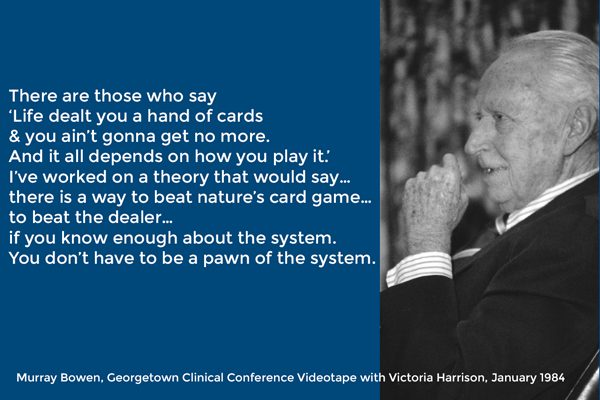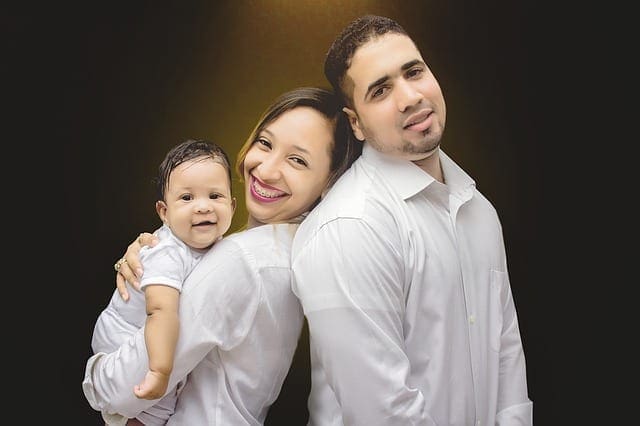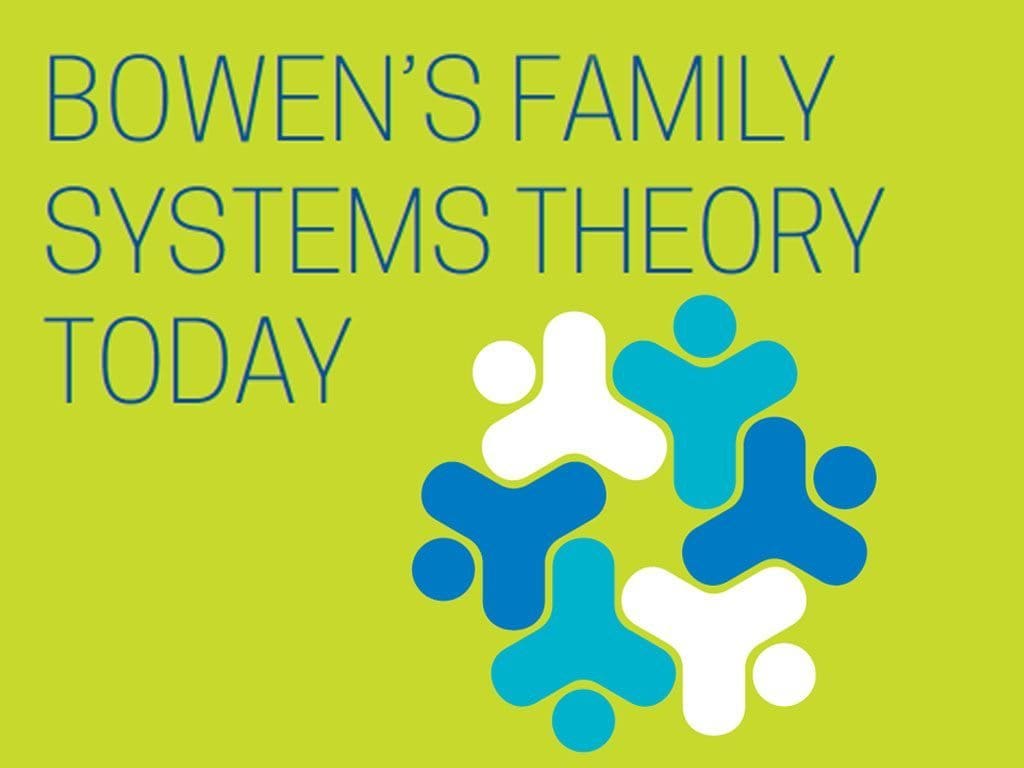Murray Bowen, MD (1913-1990) developed a new theory of human behavior based upon what he considered scientific in the work of Freud, upon studies in evolution and the natural sciences and upon his own research with families. First called “family systems theory, Bowen theory is a natural systems theory distinct from general systems theory, from the individual theories of psychiatry and psychology, and from group theories in sociology. This new theory provides alternative ways of understanding and addressing problems in the family, in organizations, and in society. Please see The Center for Family Consultation for an excellent Biography of Murray Bowen and history of Bowen family systems theory. During the study of psychiatry at The Menninger Clinic in Topeka, Kansas from 1946-1954, Bowen read extensively in biology and the study of evolution. His changing view of human functioning led to development of a research project at the National Institute of Mental Health in which families with a schizophrenic member were studied over a five-year period. The nuclear family process came alive. From 1954 to 1959, Dr. Bowen began to define concepts about the family as an emotional system that governs the biology and behavior of individuals. The first chapters in Family Therapy in Clinical Practice describe early work in defining the difference between conventional theory and this new view of the human as part of a family emotional system. By the time Bowen established The Family Center at Georgetown University in 1959, the basic concepts of theory were organized into two fundamental life forces and eight concepts: the emotional system with its variation in the counterbalance between togetherness and individuality; anxiety and chronic anxiety; levels of differentiation of self; mechanisms of reactivity in the nuclear family; triangles; multigenerational transmission process; sibling position; and emotional cut off. Differentiation of self and the scale of differentiation, along with six other interrelated concepts, formed the basis for a new view of health and human functioning. No one concept could be explained by another concept. No one concept could be eliminated or isolated from the theory. Clinical families, Bowen’s own family system, and all of human society were studied within the framework of theory. Bowen added societal emotional process, as a last concept, and emphasized the origin of problems in human society in man’s relationship to the natural world. Principles based upon these basic concepts provide a foundation for applications in research, education, psychotherapy, medicine, and personal life. Bowen theory is not a theory about pathology, but about variation in human functioning. Instead of reducing the explanation of physical illness, for example, to one cause and the affect, natural systems theory provides a framework for understanding facts and factors that impact health and functioning in the family. Any symptoms, be they physical, psychiatric, behavioral, social or societal, are the product of reactions stirred in efforts to adapt to challenges in the natural environment and in the relationship system. Levels of differentiation of self and degrees of chronic anxiety preside over the development of symptoms and over resilience. This theoretical foundation provides the direction for therapy. Applications in therapy, in research, in business and organizations, in life grow out of understanding and using Bowen theory to see the system and one’s part in it. Steps toward differentiation of self provide operating principles that guide the functioning of individuals in various fields as they learn and apply Bowen theory to solving problems in the family and organization and society.
LEARN ABOUT BOWEN THEORY

Murray Bowen Archives Project
Dr. Murray Bowen left an unprecedented collection of audio and videotapes, letters, original research records, and photographs chronicling his life’s work toward a science of human behavior. This material documents the thinking and research that led to Bowen Theory and includes continued theoretical development until his death in 1990.
Murray Bowen Archives Project will give scientists, researchers, historians, clinicians and the public access to this material. Dr. Bowen’s professional collection is housed at the National Library of Medicine (NLM) and is currently open to researchers. The Williamsburg Collection features materials from the Bowen home and office which is currently being processed for a move to NLM.
The website provides up to date information about both collections and how you can contribute toward opening the archives for the world. Donations to Murray Bowen Archives Project will assist in preserving and processing the written material, selecting material to be available in digital format, and supporting scholarship drawn on Dr. Bowen’s archives.
The Bowen Center for the Study of the Family (formerly Georgetown Family Center)
Dr. Bowen founded The Family Center, now independent of Georgetown University, to be a center for research, study, and practice in this theory. Dr. Michael Kerr became the second director in 1991. The faculty there apply Bowen theory toward problems facing families, organizations, and human society. The Bowen Center Postgraduate Training Program provides ongoing training to professionals from various fields throughout the US and world.
Families Reunited – Where Do We Go From Here?
The practice of separating children from their parents and resulting consequences continue to be current concerns. In spite of the previous court order, families are still being separated at the border.
The Impact of Separation from Family: A Timely and Timeless Lesson
Separating children from their parents while attempting to cross from Mexico into the United States without authorization often also means separation from the family. Both have adverse affects on the children and parents, the family and future generations.
Bowen’s Family Systems Today
Bowen theory clinicians and educators share some insights on how Bowen's Family Systems Theory has continued to impact the field of mental health for decades, not only in marriage and family therapy, but reaching into other mental health fields, and how it influences current theory, teaching, and interventions.
Managing Challenge = Managing Self
Houston and the Gulf Coast of Texas and Louisiana are recovering from the worst flood in history. How can people best deal with the emotional impact for themselves as well as their family and friends?
Being Human
Join in the discussion of the CSNSF Symposium right here.
Discussion Paper April 2016
My most important learning from the readings is a growing appreciation of the interconnectedness of life throwing up questions about the usefulness of the idea of the individual. The other important emphasis from the readings for me was the fragility of balance within the wide variety of these interconnections whether we are describing intimate associations between cells, with symbionts and hosts right through to the balance of the individual with family members.
Charles Darwin & Murray Bowen
I often find myself thinking about Charles Darwin and Murray Bowen and their ability to see the world from a different point of view. They are not unique in their ability to do this but it is a rare quality.
The Difference Bowen Theory Makes
"The therapist's theoretical assumptions about the nature and origin of emotional illness serve as a blueprint that guides his thinking and actions during psychotherapy." -- Murray Bowen, page 337 Family Therapy in clinical Practice
Evolution and the Family
When I began to teach Bowen family systems theory in Texas in the early 1990’s, people would walk out when I mentioned the evolutionary history of the family.
The Human as a Part of Nature
In an earlier seminar, one of the participants responded to a query, "What would tilt people toward systems thinking?" by stating, "When there is an understanding that "man" is a part of nature; man is part of other living things."







